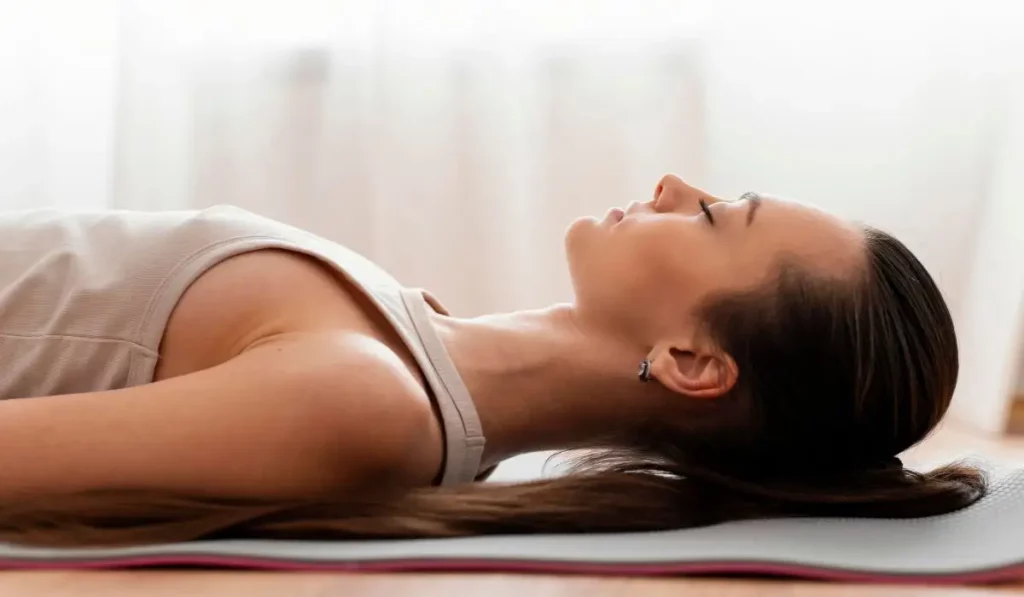Do you wake in the middle of the night, despite a day of exhaustion? What if it were as simple as breathing that would keep you sleeping peacefully? You’re about to discover how adding sleep breathing exercises to your evening routine can transform your nights and make you wake in the mornings feeling refreshed. This blog discusses helpful advice on maximizing your sleep, unwinding to the fullest, and having the best night’s sleep possible. Ready to discover the relaxing power of breath?
The Power of Sleep Breathing Exercises
Breathing exercises are not only a stress-relief system—they’re a sleep change agent. Centering your mind in your breath activates the body’s relaxation response, which can drive stress away and quiet your body and mind for sleep. Healthy breathing habits can calm your heart rate, reduce your blood pressure, and settle your nervous system, enabling you to sleep and sleep peacefully all night. With frequent practice, sleep breathing exercises are a great tool for a restful repose.
Sleep Breathing Techniques: How They Work
Sleep breathing exercises are simple but very effective. They relax you, and this informs your body that it is bedtime. As you regulate your breathing, you trigger deeper and more relaxed breathing, which informs your brain that it is time for bed. By practicing a technique such as box breathing or the 4-7-8 method, these exercises put your body to bed and prepare the best environment for sleeping. Doing these sleep breathing exercises daily conditions your body to respond to relaxation.
Deep Breathing Exercises for a Better Night’s Sleep
Deep breathing exercises are an excellent method of conditioning your body to sleep, particularly when you are stressed or anxious before sleeping. Deep breathing exercises entail breathing in and out in long and deep breaths, relaxing your body to its core. Breathing with the use of the diaphragm and breathing slowly, you let go of tension and condition your body for deep sleep. One of the best methods is diaphragmatic breathing, which entails filling lungs’ capacity and inflating the diaphragm. Not only does this minimize tension, but it also generates a better oxygen supply, which can be seen in good sleep. Adding deep breathing exercises to your sleeping routine can significantly affect how fast you fall asleep.
Breathing Exercises to Fall Asleep Quickly
If you have trouble sleeping most of the time, using some breathing exercises that relax you within a few minutes can significantly help. One of the most widely employed is the 4-7-8 breathing technique, in which you inhale for 4 seconds, hold for 7 seconds, and exhale for 8 seconds. This relaxes the nervous system and informs the body that it’s time to sleep. You can calm the mind, silence loud thoughts, and set the ideal sleeping environment through this repetition a few times. Regular use of breathing exercises to fall asleep faster has been shown to significantly reduce falling asleep time so that you can get the rest you need to wake up refreshed in the morning.
Diaphragmatic Breathing for Sleep: Relax Your Way to Rest
Abdominal breathing, or diaphragmatic breathing, is one of the best methods of improving sleep quality. Diaphragmatic breathing involves breathing into the belly while you breathe deeply so that the lungs are full of air. Unlike shallow chest breathing, diaphragmatic breathing activates the parasympathetic nervous system, which calms the body. Doing this technique before sleep prepares your body for a refreshing and restful sleep. Diaphragmatic breathing for sleep also reduces the physical tension that keeps you from sleeping, and easily makes you sleep.
How to Incorporate Sleep Breathing Exercises into Your Daily Routine
Incorporating breathing exercises into your sleep routine doesn’t necessarily have to be hard. There are several ways that you can incorporate breathing exercises into your routine to enhance your sleep:
- Take 10-15 minutes just before bedtime, totally on breathing exercises.
- Dim the lights, turn off the screens, and get into a comfortable position to create a soothing environment.
- Practice diaphragmatic or deep breathing to start calming and relaxing your mind.
- Practice the 4-7-8 technique for an easy and quick way of calming your nervous system and falling asleep faster.
Incorporate breathing exercises into a nightly evening routine for long-term sleep benefits. By adding breathing exercises to your daily routine, you will improve the quality of your sleep, relaxation, and stress relief.
SleepMentor: The Sleep Guide to Better Sleep
We understand at SleepMentor how hard it can be to sleep. So we’re here to help you with tools, tips, and information about improving your sleep naturally. And if you’re suffering from stress, insomnia, or other sleep disorders, the addition of sleep breathing exercises to your daily routine can help you get back to restful nights. With the aid of SleepMentor professionals, you can take back control of your sleep and unlock the healing potential of deeper rest.
Conclusion
Sleep breathing exercises are simple but powerful tools for improving sleep and overall health. From simple breathing to more intense techniques like the 4-7-8 method and diaphragmatic breathing, they can help you fall asleep quicker, remove anxiety, and enjoy higher quality sleep. By adding sleep breathing exercises to your nighttime regimen, you’ll be given the chance for improved nights and healthier mornings. SleepMentor can help you get better sleep with professional guidance and support.





